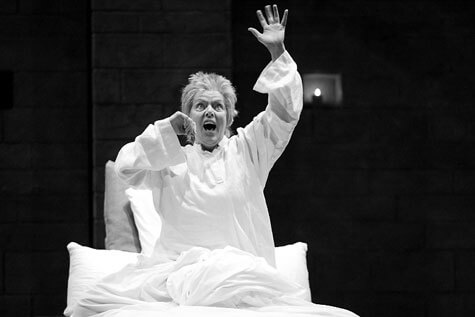Peter Mattei maintains his Puccini poise; City Opera’s ‘Carmelites’ traces a steady course
Joyce Castle as Madame de Croissy in New York City Opera’s production of Poulenc’s “Dialogues of the Carmelites” directed by Tazewell Thompson.
You know you’re in trouble when the best thing about a performance of “La Bohème” is the Marcello role, but this season’s revival of the Puccini opera at the Metropolitan Opera, seen on October 23, features a really superb artist in the role—Peter Mattei. The tall, handsome baritone boasts an even, mellow lyric sound and a firm Italianate legato, not to mention a romantic star’s stage presence.
Mattei’s fresh performance stood out in stark contrast to that of his Musetta, Ainhoa Arteta. The soprano’s voice, barely a decade into her international career, is stripped threadbare. A terrible pity, since she still looks lovely and acts expertly—but I am afraid we won’t be hearing anything more from her in the future.
The evening’s Rodolfo, Marcelo Álvarez, has fortunately developed in the opposite direction. When I last heard him (in “Traviata” five or six years ago), I was underwhelmed at his crooning and breathy tone. In the intervening years, the tenor has pulled himself together quite neatly. The voice is not large, but compact and pingy, with easy access to the top, and he’s not afraid of interpolating the occasional veristic sob. As an actor, well, he’s a tenor, mostly singing straight out into the house and saving dramatic interaction for moments when he’s silent
Soprano Ruth Anne Swenson is in the middle of a transition from coloratura to lyric roles, and thus far it’s impossible to call the process an unqualified success. While the tone is certainly ample enough for the role of Mimi, Swenson swallows up a lot of the sound in an apparent attempt to darken and enrich the color. The result is that, even at full volume, Swenson sounds like she’s holding back, cautious. That attitude, when combined with her Tracy Turnblad silhouette, results in a less than credible tubercular heroine.
Perhaps it’s unfair to judge any of these singers on the basis of this performance, given that they were struggling all night with what I have to call the worst conducting of “La Bohème” I have heard in 30 years of operagoing. No, let me amend that. This was the worst conducting of any opera I have ever heard, and that includes pick-up performances in church basements.
Literally dozens of times in this brief score, the conductor managed to cue downbeats so late that the singers were left vocalizing over harmonic suspensions that would have startled Alban Berg, let alone Puccini. Tempi came in only two speeds: too fast and too slow. Predictably, the complicated second act degenerated into an utter train wreck; the only time everyone onstage united rhythmically was when they were following the beat of the actor playing the drum major.
That man down in the pit flailing and fluttering to such grisly effect is named Daniel Oren. The next time you see him, will you please boo him for me?
Oren’s incompetence is all the more mind-boggling when you consider that “La Bohème” is a work the Met orchestra has played practically every year for the past two decades.
Meanwhile, George Manahan coolly pulled together the orchestra of the New York City Opera for a rock-solid account of the unfamiliar score of Poulenc’s “Dialogues of the Carmelites” on October 17.
This opera is a ballsy choice for the NYCO, given that John Dexter’s frequently revived Met staging of “Carmelites” is justly regarded as a classic. Director Tazewell Thompson coaxed strong, detailed performances from his large cast, in particular Joyce Castle as the ailing Old Prioress and Rinat Shaham as the novice Blanche.
For my taste, the nuns played their emotion rather too openly; in the final march to the guillotine they struck poses like so many drama queens. But on the other hand, Thompson crafted a variety of striking stage pictures from a minimalist unit set consisting of nothing more than a stone wall and a couple of long tables.
Vocal standouts were Shaham (a mezzo in a soprano role, but when it’s a mezzo of such quality and beauty, I’m not complaining) and Eugenie Grunewald as a tough-as-nails Mother Marie, flinging out bonze-toned high notes that could be the envy of any Amneris.
James Jorden is the editor of parterre box, the queer opera zine (parterre.com)


































